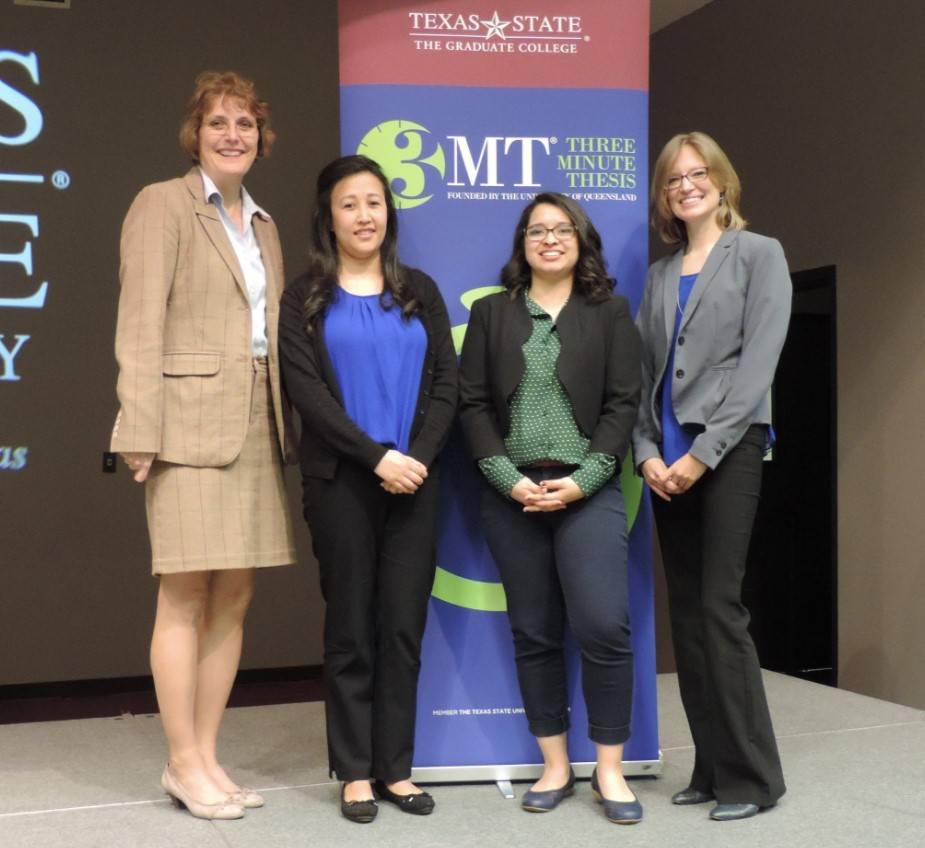College of Education doctoral student wins first place in Three Minute Thesis competition
College of Education doctoral student wins Three Minute Thesis competition
Emma Carberry | July 10, 2019
Each year, the Graduate College hosts a Three Minute Thesis (3MT) competition for Texas State students enrolled in a research Ph.D. or Ed.D. program or a thesis-track master’s program. This research communication competition gives students three minutes to present a compelling oration on their thesis or dissertation research and its significance. 3MT is designed to better equip student researchers to translate their research for non-specialist audiences.
At this year’s competition, Developmental Education doctoral student Meagan Hoff left with the $1000 first-place prize for her presentation “The Initial Lie: Barriers to Higher Education for Refugees.” Hoff’s presentation was a summation of her dissertation research’s pilot study. The pilot focused on a series of interviews she conducted with a high school senior who had come to the United States as a refugee and was interested in pursuing a higher education. This student was just one of several refugees Hoff ultimately interviewed for her dissertation research, which aims to uncover obstacles that refugee students face as they pursue university degrees.

Hoff began the doctoral program in Developmental Education with an interest in learning about how students succeed in college. Having completed a master’s degree in France, she had first-hand experience in the difficulties that come with navigating a university environment in a different country and culture. This interest translated to the refugee population when she taught a summer camp for teenage girls from refugee backgrounds after her first year in the doctoral program. Through conversations with the girls she met at the camp, Hoff found that many of them wanted to go to college but were confused by much of the process, just as she was in France. These conversations motivated her to look into research in the area of refugees in American higher education, and she found that there was very little. For the most part, Hoff says, current research focuses on children or adults who came to the United States with limited literacy skills. She began to think, “there’s this whole population of refugees who are capable of being successful in American universities that is being overlooked.”
So, Hoff began her pilot study. In her conversations with her research subject, she quickly uncovered the informational barriers that this student was facing. The student was able to acquire some information from her peers, but was unable to turn to her family because they had fled their country before reaching higher education. Hoff saw that this student was aware of her shortcomings, such as needing to recover information she had missed by entering the American school system later than her classmates. However, even in scenarios where the student asked for assistance in understanding the implicit expectations of graded assignments in the American school system, Hoff found that adults around the student were unable or unwilling to help. Ultimately, the student was left without the basic information about college that she needed to be successful.
|
"There's this whole population of refugees who are capable of being successful in American universities that is being overlooked." -Meagan Hoff, Developmental Education doctoral student |
Since her pilot study, Hoff has interviewed several other refugees who are seeking higher education degrees. They range in age from 19 to 40 and have sought refuge from countries around the world, including Myanmar, Morocco, Iraq and Syria. Gaining access to this population was one of the reasons Hoff chose to participate in 3MT in the first place. The $1000 prize afforded her the opportunity to travel the country and meet with refugees in states outside of Texas.
Another reason Hoff found 3MT beneficial was that it began to prepare her for the imminent job search she will begin after she graduates. Her search for a faculty position at a university where she can continue to support refugees will necessitate her ability to concisely talk about the importance of her research. Following her 3MT success, Hoff has already been asked to give her three-minute presentation to staff from the University of Texas and Southern New Hampshire University’s global refugee program.
Hoff is currently working on writing up her research results and will be defending her dissertation this coming fall semester. As she moves onto the next stage in her life, her goal is to be able to continue working directly with refugee students while also contributing to the growing body of research around refugee students in higher education as a faculty member at a university. She is passionate about making sure that people from all backgrounds can pursue a college education. “It can have such a strong impact on communities when you increase the number of people with higher ed degrees,” she shares.